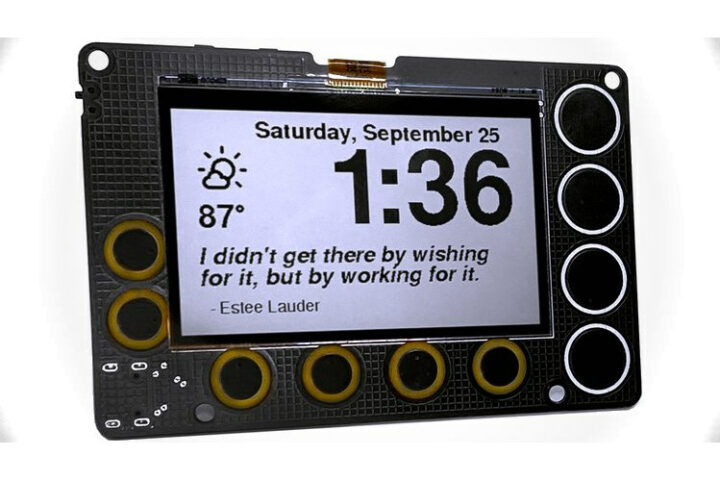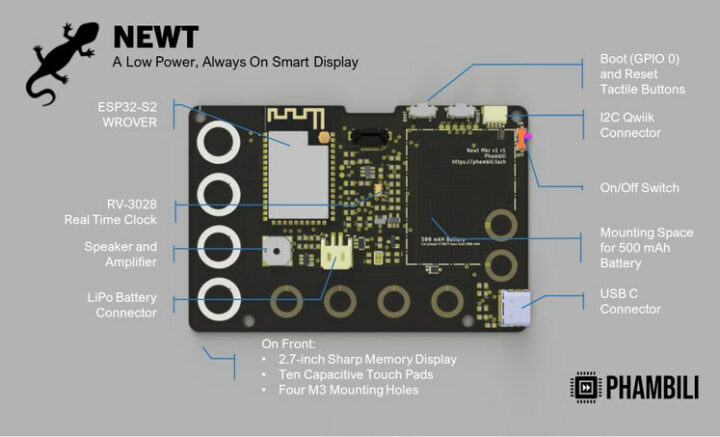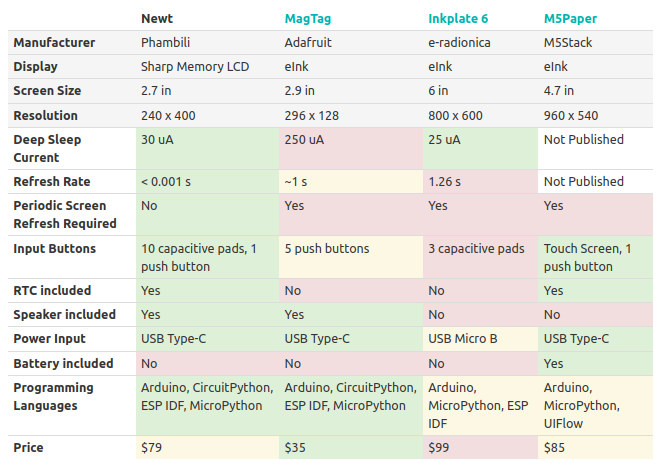Newt is a battery-powered, always-on, ESP32-S2 wireless display with a 2.7-inch display leveraging SHARP’s Memory-in-Pixel (MiP) technology to provide an experience similar to E-Ink displays but with a much faster refresh rate.
The wireless display can connect to the Internet to retrieve weather, calendars, sports scores, to-do lists, quotes, and whatever you’d like. Since it is powered by an ESP32-S2 microcontroller you can program with the ESP-IDF framework, Arduino, MicroPython, or CircuitPython.
- WiFi module – Espressif ESP32-S2-WROVER module with ESP32-S2 single-core Xtensa LX7 processor @ 240 MHz with 4 MB flash and 2 MB PSRAM
- Display – 2.7-inch, 240 x 400 pixel SHARP MiP LCD with “high-contrast, high-resolution, low-latency content with ultra-low power consumption”, reflective mode to eliminate the need for a backlight.
- USB – 1x USB Type-C port for programming, power, and charging
- Expansion – I2C Qwiik connector
- Misc
- Micro Crystal RV-3028-C7 RTC (45nA power consumption) with hardware interrupt
- Buzzer plus mini class-D amplifier on DAC output A0 to play tones or lo-fi audio clips
- Power switch, Reset and Boot tactile buttons
- 10 capacitive touchpads
- Power Supply
- 5V via USB-C port
- 2-pin JST connector with NCP73831 battery-charging circuity; a 500 mAh LiPo battery can power the display for one or two months on a charge depending on use.
- Power Consumption – Deep sleep current as low as 25 uA
- Dimensions – 91 x 61 x 9 mm
Newt can be wall-mounted, but Phambili offers two other mounting options with a desktop wooden stand and four mini-magnet feet to affix Newt to metallic surfaces (dry erase boards, refrigerators, etc..). The EAGLE hardware design files and RTC Arduino library can already be found in the company’s Github account, but the firmware is still being worked on and more is coming with Arduino and CircuitPython sample programs and libraries such as Adafruit GFX (fonts handling) and Adafruit Sharp Memory Display.
When comparing Phambili Newt to E-Ink wireless display like Adafruit MagTag, Inkplate 6, or M5Stack M5Paper, we’ll notice the refresh is shown to be under 0.001s, against 1+ second for the E-Ink models, while deep sleep power consumption is similar or better, but the price is higher for a display of similar dimensions and resolution.
Newt ESP32 display is currently available on CrowdSupply with a $5,000 funding goal that should be surpassed within the next few days. There are two rewards one for $79 for the display itself, and another one for $10 for optional mounting hardware (desktop mount and mini magnets). The short demo below shows the display does not suffer from the low refresh from E-Ink displays.

Jean-Luc started CNX Software in 2010 as a part-time endeavor, before quitting his job as a software engineering manager, and starting to write daily news, and reviews full time later in 2011.
Support CNX Software! Donate via cryptocurrencies, become a Patron on Patreon, or purchase goods on Amazon or Aliexpress








The first photo is a bit confusing, it really looks like there’s light emitted behind the LCD that lights the PCB, the connectors, the LCD’s glass, and that shines through the LCD. The second one looks more like a passive display.
I suspect the first photo was taken with the camera’s flash.
Ah that’s very possible indeed! And it would explain why the reflective background looks so bright.
Jena-Luc is correct- the flash from the photo is causing the lighting effect. The Newt is not backlight, but is still extremely readable in daylight, sunlight, room light, etc. That’s some of the “magic” of the Sharp Memory Displays – passive-like (like and eInk display) with the sharpness and refresh rates of an OLED. (From Darian – the maker of the Newt)
Eh, for that price point I would rather just purchase the display module and use my own existing boards with it. https://www.adafruit.com/product/4694
Newt boards are now shipping, or soon will be.